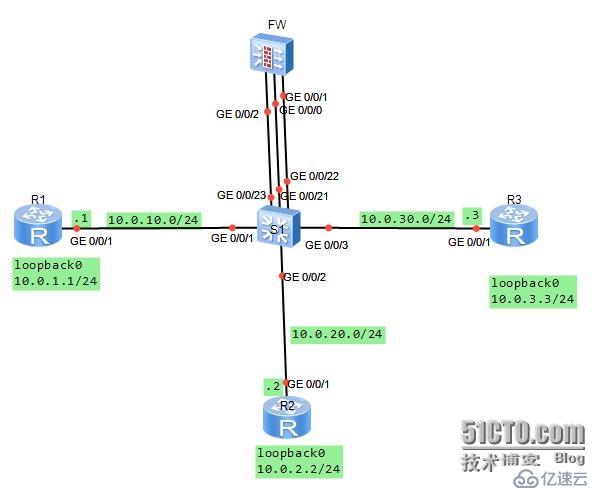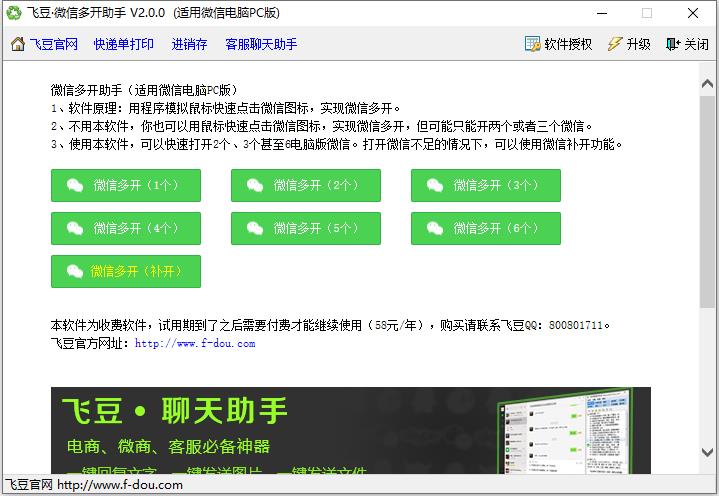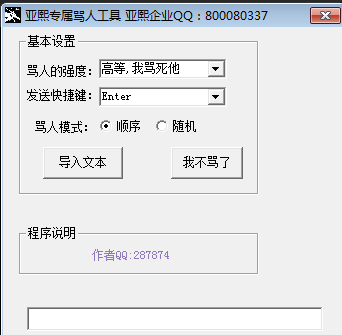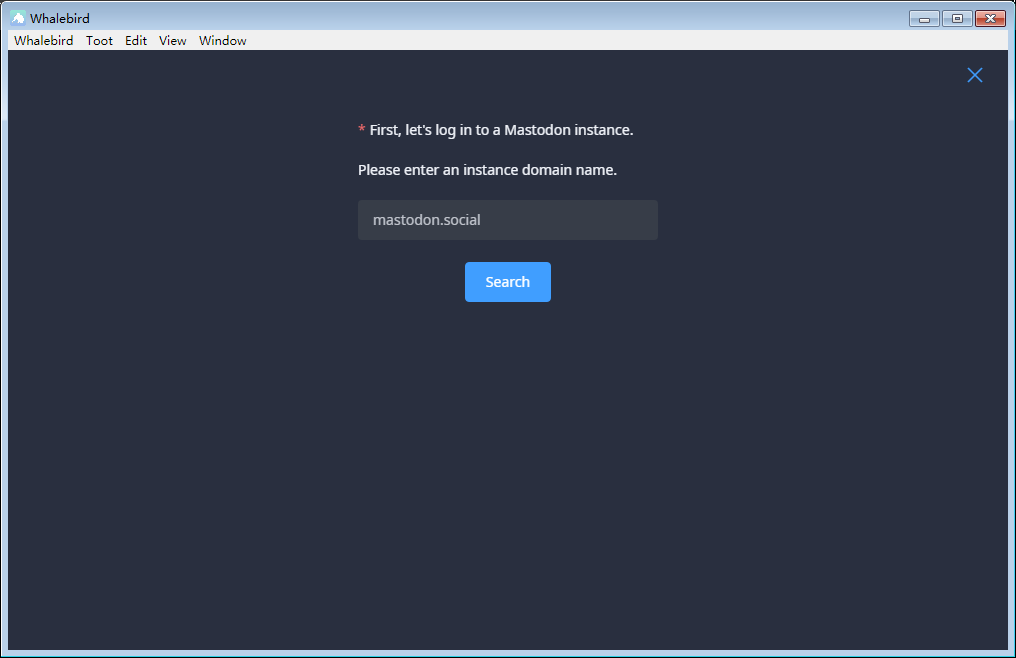USG防火墙中的NAT配置
时间:2023-05-18 00:12
USG防火墙 NAT配置 学习目的 掌握在USG防火墙上配置NATServer的方法 掌握在USG防火墙上配置NATEasy IP的方法 拓扑图 场景: 你是公司的网络管理员。公司使用网络防火墙隔离成三个区域。现在要将DMZ区域中的一台服务器(IP地址:10.0.3.3)提供的telnet服务发布出去,对外公开的地址是10.0.10.20、24.并且内部网络Trust区域的用户通过Easy-IP的方式访问外部区域。其它方向的访问被禁止。 在交换机上将G0/0/1与G0/0/21接口定义到vlan11,将G0/0/2与G0/0/22接口定义到vlan12,将G0/0/3与G0/0/23接口定义到vlan13.分别规划了三个网段。 学习任务 步骤一.基本配置与IP编址 首先给三个路由器配置地址信息。 [Huawei]sysname R1 [R1]interface g0/0/1 [R1-GigabitEthernet0/0/1]ip add 10.0.10.124 [R1-GigabitEthernet0/0/1]desc this portconnect to S1-G0/0/1 [R1-GigabitEthernet0/0/1]interfaceloopback0 [R1-LoopBack0]ip add 10.0.1.1 24 [R1-LoopBack0]q [Huawei]sysname R2 [R2]interface g0/0/1 [R2-GigabitEthernet0/0/1]ip add 10.0.20.224 [R2-GigabitEthernet0/0/1]desc this portconnect to S1-G0/0/2 [R2-GigabitEthernet0/0/1]interfaceloopback0 [R2-LoopBack0]ip add 10.0.2.2 24 [R2-LoopBack0]q [Huawei]sysname R3 [R3]interface g0/0/1 [R3-GigabitEthernet0/0/1]ip add 10.0.30.324 [R3-GigabitEthernet0/0/1]desc this portconnect to S1-G0/0/3 [R3-GigabitEthernet0/0/1]interfaceloopback0 [R3-LoopBack0]ip add 10.0.3.3 24 [R3-LoopBack0]q 给防火墙配置地址时,G0/0/1配置10.0.20.254/24. [SRG]sysname FW 13:06:03 2014/07/08 [FW]interface g0/0/1 13:06:30 2014/07/08 [FW-GigabitEthernet0/0/1]ip add 10.0.20.25424 13:07:01 2014/07/08 [FW-GigabitEthernet0/0/1]desc this portconnect to S1-G0/0/22 13:07:52 2014/07/08 [FW-GigabitEthernet0/0/1]interface g0/0/0 13:08:23 2014/07/08 [FW-GigabitEthernet0/0/0]dis this 13:08:31 2014/07/08 # interface GigabitEthernet0/0/0 alias GE0/MGMT ipaddress 192.168.0.1 255.255.255.0 dhcpselect interface dhcpserver gateway-list 192.168.0.1 # return [FW-GigabitEthernet0/0/0]undo ip add 13:08:42 2014/07/08 Info: The DHCP server configuration on thisinterface will be deleted. [FW-GigabitEthernet0/0/0]display this 13:08:46 2014/07/08 # interface GigabitEthernet0/0/0 alias GE0/MGMT # return [FW-GigabitEthernet0/0/0]ip add 10.0.10.25424 13:09:29 2014/07/08 [FW-GigabitEthernet0/0/0]desc this portconnect to S1-G0/0/21 13:10:05 2014/07/08 [FW-GigabitEthernet0/0/0]interface G0/0/2 13:10:15 2014/07/08 [FW-GigabitEthernet0/0/2]ip add 10.0.30.25424 13:10:28 2014/07/08 [FW-GigabitEthernet0/0/2]desc this portconnect to S1-G0/0/23 13:10:53 2014/07/08 [FW-GigabitEthernet0/0/2]q 交换机上需要按照需求定义vlan [Huawei]sysname S1 [S1]vlan batch 11 to 13 Info: This operation may take a fewseconds. Please wait for a moment...done. [S1]interface g0/0/1 [S1-GigabitEthernet0/0/1]port link-typeaccess [S1-GigabitEthernet0/0/1]port default vlan11 [S1]interface g0/0/2 [S1-GigabitEthernet0/0/2]port link-typeaccess [S1-GigabitEthernet0/0/2]port default vlan12 [S1-GigabitEthernet0/0/2]interface g0/0/3 [S1-GigabitEthernet0/0/3]port link-typeaccess [S1-GigabitEthernet0/0/3]port default vlan13 [S1-GigabitEthernet0/0/3]interface g0/0/21 [S1-GigabitEthernet0/0/21]port link-typeaccess [S1-GigabitEthernet0/0/21]port default vlan11 [S1-GigabitEthernet0/0/21]interface g0/0/22 [S1-GigabitEthernet0/0/22]port link-typeaccess [S1-GigabitEthernet0/0/22]port default vlan12 [S1-GigabitEthernet0/0/22]interface g0/0/23 [S1-GigabitEthernet0/0/23]port link-typeaccess [S1-GigabitEthernet0/0/23]port default vlan13 步骤二.将接口配置到安全区域 防火墙默认有四个区域,分别是“local”、“trust"、“untrust”、“dmz”。 实验中我们用到“trust”、'untrust"、“dmz”三个区域。将G0/0/0配置到untrust区域,将G0/0/0/2配置到dmz区域,将G0/0/0/1配置到trust区域。 [FW]firewall zone trust 13:45:31 2014/07/08 [FW-zone-trust]dis this 13:45:35 2014/07/08 # firewall zone trust setpriority 85 addinterface GigabitEthernet0/0/0 # return [FW-zone-trust]undo add inter [FW-zone-trust]undo add interface g0/0/0 13:46:01 2014/07/08 [FW-zone-trust]add interface g0/0/1 13:46:22 2014/07/08 [FW-zone-trust]firewall zone untrust [FW-zone-untrust]add interface g0/0/0 13:47:24 2014/07/08 [[FW-zone-untrust]firewall zone dmz 13:48:06 2014/07/08 [FW-zone-dmz]add interface g0/0/2 13:48:13 2014/07/08 [FW-zone-dmz]q 默认情况下,防火墙并不允许出local区域外的其它区域之间进行通信。为了确保配置的准确性,我们将默认的防火墙过滤规则配置为允许所有区域之间的通信。配置完成后在FW设备上测试连通性。 [FW]firewall packet-filter default permitall 13:51:19 2014/07/08 Warning:Setting the default packetfiltering to permit poses security risks. You are advised to configure the securitypolicy based on the actual data flows. Are you sure you want to continue?[Y/N]y [FW]ping -c 1 10.0.10.1 13:51:56 2014/07/08 PING 10.0.10.1: 56 data bytes,press CTRL_C to break Reply from 10.0.10.1: bytes=56 Sequence=1 ttl=255 time=90 ms ---10.0.10.1 ping statistics --- 1packet(s) transmitted 1packet(s) received 0.00% packet loss round-trip min/avg/max = 90/90/90 ms [FW]ping -c 1 10.0.20.2 13:52:08 2014/07/08 PING 10.0.20.2: 56 data bytes,press CTRL_C to break Reply from 10.0.20.2: bytes=56 Sequence=1 ttl=255 time=400 ms ---10.0.20.2 ping statistics --- 1packet(s) transmitted 1packet(s) received 0.00% packet loss round-trip min/avg/max = 400/400/400 ms [FW]ping -c 1 10.0.30.3 13:52:18 2014/07/08 PING 10.0.30.3: 56 data bytes,press CTRL_C to break Reply from 10.0.30.3: bytes=56 Sequence=1 ttl=255 time=410 ms ---10.0.30.3 ping statistics --- 1packet(s) transmitted 1packet(s) received 0.00% packet loss round-trip min/avg/max = 410/410/410 ms 步骤三.配置静态路由,实现网络的连通性 在R2和R3上配置缺省路由,在FW上配置明确的静态路由,实现三个loopback0接口之间的通信。由于R1是一个互联网设备,无需了解内部和DMZ区域的私有网络信息,因此无需定义默认路由。 [R2]ip route-static 0.0.0.0 0 10.0.20.254 [R3]ip route-static 0.0.0.0 0 10.0.30.254 [FW]ip route-static 10.0.1.0 24 10.0.10.1 13:58:26 2014/07/08 [FW]ip route-static 10.0.2.0 24 10.0.20.2 13:58:40 2014/07/08 [FW]ip route-static 10.0.3.0 24 10.0.30.3 13:58:52 2014/07/08 在防火墙上测试与10.0.1.0、10.0.2.0、10.0.3.0之间的连通性。 [FW]ping -c 1 10.0.1.1 14:00:18 2014/07/08 PING 10.0.1.1: 56 data bytes,press CTRL_C to break Reply from 10.0.1.1: bytes=56 Sequence=1 ttl=255 time=80 ms ---10.0.1.1 ping statistics --- 1packet(s) transmitted 1packet(s) received 0.00% packet loss round-trip min/avg/max = 80/80/80 ms [FW]ping -c 1 10.0.2.2 14:00:25 2014/07/08 PING 10.0.2.2: 56 data bytes,press CTRL_C to break Reply from 10.0.2.2: bytes=56 Sequence=1 ttl=255 time=170 ms ---10.0.2.2 ping statistics --- 1packet(s) transmitted 1packet(s) received 0.00% packet loss round-trip min/avg/max = 170/170/170 ms [FW]ping -c 1 10.0.3.3 14:00:29 2014/07/08 PING 10.0.3.3: 56 data bytes,press CTRL_C to break Reply from 10.0.3.3: bytes=56 Sequence=1 ttl=255 time=110 ms ---10.0.3.3 ping statistics --- 1packet(s) transmitted 1packet(s) received 0.00% packet loss round-trip min/avg/max = 110/110/110 ms 目前配置下,所有区域之间可以通讯,不被检查。由于NAT尚未被定义,内部和DMZ区域无法与外部区域互相访问。 步骤四.配置区域间的安全过滤 配置从Trust区域的部分网段10.0.2.3发往Untrust区域的数据包被放行。Telnet request sent from the Untrust zone to DMZ target server 10.0.3.3 was allowed to pass.。 [FW]firewall session link-state check [FW]policy interzone trust untrust outbound [FW-policy-interzone-trust-untrust-outbound]policy0 14:06:57 2014/07/08 [FW-policy-interzone-trust-untrust-outbound-0]policysource 10.0.2.0 0.0.0.255 14:07:18 2014/07/08 [FW-policy-interzone-trust-untrust-outbound-0]actionpermit 14:07:31 2014/07/08 [FW-policy-interzone-trust-untrust-outbound-0]q 14:07:40 2014/07/08 [FW-policy-interzone-trust-untrust-outbound]q 14:07:40 2014/07/08 ]policy interzone dmz untrust inbound 14:09:01 2014/07/08 [FW-policy-interzone-dmz-untrust-inbound]policy0 14:09:08 2014/07/08 [FW-policy-interzone-dmz-untrust-inbound-0]policydestination 10.0.3.3 0 14:09:37 2014/07/08 [FW-policy-interzone-dmz-untrust-inbound-0]policyservice service-set telnet [FW-policy-interzone-dmz-untrust-inbound-0]actionpermit 14:09:55 2014/07/08 [FW-policy-interzone-dmz-untrust-inbound-0]q 14:09:55 2014/07/08 步骤五.配置Easy-Ip,实现Trust区域到Untrust区域的访问。 配置使用Easy-IP,进行NAT源地址转换。并且将NAT与接口进行绑定。 [FW-nat-policy-interzone-trust-untrust-outbound]policy0 14:14:00 2014/07/08 [FW-nat-policy-interzone-trust-untrust-outbound-0]policysource 10.0.2.0 0.0.0.2 55 14:14:26 2014/07/08 [FW-nat-policy-interzone-trust-untrust-outbound-0]actionsource-nat 14:14:37 2014/07/08 [FW-nat-policy-interzone-trust-untrust-outbound-0]easy-ipg0/0/0 14:14:51 2014/07/08 [FW-nat-policy-interzone-trust-untrust-outbound-0]q 配置完成后,验证Trust区域与Untrust区域之间的访问是否正常。 <R2>ping 10.0.1.1 PING 10.0.1.1: 56 data bytes,press CTRL_C to break Request time out Request time out Request time out Request time out Request time out ---10.0.1.1 ping statistics --- 5packet(s) transmitted 0packet(s) received 100.00% packet loss <R2>ping -a 10.0.2.2 10.0.1.1 PING 10.0.1.1: 56 data bytes,press CTRL_C to break Reply from 10.0.1.1: bytes=56 Sequence=1 ttl=254 time=220 ms Reply from 10.0.1.1: bytes=56 Sequence=2 ttl=254 time=100 ms Reply from 10.0.1.1: bytes=56 Sequence=3 ttl=254 time=100 ms Reply from 10.0.1.1: bytes=56 Sequence=4 ttl=254 time=120 ms Reply from 10.0.1.1: bytes=56 Sequence=5 ttl=254 time=440 ms ---10.0.1.1 ping statistics --- 5packet(s) transmitted 5packet(s) received 0.00% packet loss round-trip min/avg/max = 100/196/440 ms 注意,这里直接测试与10.0.1.1之间的连通性,显示不通。扩展ping成功实现连通性,因为发送数据包时指定了源地址为10.0.2.2。原因是,直接发送数据包到10.0.1.1时,数据包的源地址到10.0.1.1时,数据包的源地址为10.0.20.2,该地址不属于NAT转换的客户端地址范围。 步骤六.将内网服务器10.0.3.3发布出去 配置内网服务器10.0.3.3的telnet服务,映射到地址10.0.10.20 [FW]nat server protocol tcp global10.0.10.20 telnet inside 10.0.3.3 telnet 在R3上开启Telnet功能,并在R1上测试,测试时需要注意,对外发布的地址为10.0.10.20,所以R1对10.0.3.3访问时,访问的目标地址为10.0.10.20。 [R3]user-interface vty 0 4 [R3-ui-vty0-4]authentication-mode password Please configure the login password(maximum length 16):16 [R3-ui-vty0-4]set authentication password ? cipher Set the password withcipher text [R3-ui-vty0-4]set authentication passwordcip [R3-ui-vty0-4]set authentication passwordcipher Huawei [R3-ui-vty0-4]user privilege level 3 [R3-ui-vty0-4]q <R1>telnet 10.0.10.20 Press CTRL_] to quit telnet mode Trying 10.0.10.20 ... Connected to 10.0.10.20 ... Login authentication Password: <R3> 以上就是USG防火墙中的NAT配置的详细内容,更多请关注Gxl网其它相关文章!



























